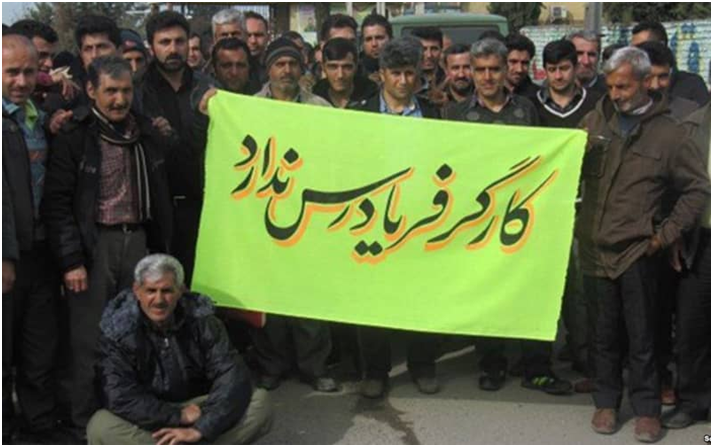
The state-run Iranian Labour News Agency (ILNA) has reported that four worker representatives, covering some 200 Tehran Metro ticket sales employees, who were invited to a meeting by their employer’s contractor to discuss the workers’ wage arrears, have been summarily dismissed. Their employment paperwork was unceremoniously handed to them, and they were told to leave the premises immediately owing to the “trouble” they had apparently caused for their employers.
It had recently been reported that the company that had signed the original contracts of employment with workers at the ticket sales department of Tehran Metro had abruptly transferred the said contracts to another company without settling the workers’ wage arrears first.. The workers duly elected four representatives to pursue the demands for their outstanding wages from the contracting company. These representatives were then invited by the new contractor to attend a meeting on Monday 17 April ostensibly at which the issue of the wage arrears would be discussed. However, upon arrival at the meeting, it was clear that the situation was quite different – in fact, a ruse. The original contractor had apparently rejected the workers’ demands for the payment of their outstanding wages and conveyed this to the newly contracted employers. Thus the workers representatives were dismissed out of hand as “troublemakers” and were promptly fired on the spot. The four representatives’ files and paperwork were handed back to them and they were told by the new contractor in no uncertain terms that “no new contract would be signed with [them] again!”
“We worked for years. We were given extra work to do, over and above our job descriptions. They have not paid for our overtime or for extra shift work. They cut years off of our work continuity and experience through the trick of changing their [trading] name and the [registered] number of the workshop. However, we did not complain as we did not want to be fired. When the contractor changed, we asked for [the reinstituting of] our rights, but the new contractor opposed us and threatened that if we continued to pursue our wages from the previous contractor then there would be no new contract,” stated one of the dismissed workers’ representatives.
Unfortunately, such stories of workers fired for pursuing their most basic of rights (including outstanding wages) are all too common in Iran.
In the Islamic Republic of Iran, workers do not have powerful trade unions acting and representing on their behalf… This is a simple fact in terms of the current prevailing reality inside the country. Thus, such measures taken by the employer, while being prima facie draconian, are commonplace. Owing to workers being engaged on precarious temporary contractual arrangements, dismissal is a relatively straightforward and un-costly option for the employer, while workers have minimal if any protection and cannot rely on the support of any organisation. It is in these circumstances that the new contractor for Tehran Metro’s ticket sales department was able to threaten and simply dispense with the workers’ representatives, while the original employer was able to refuse to pay the workers’ outstanding salaries without the slightest challenge or intercession from the authorities in Iran. Furthermore, against this chaotic backdrop, Tehran Municipal Authority, as the main employer, has refused to implement Article 13 of Iran’s Labour Code. This article holds the main contractor (in this case; Tehran Municipality) ultimately responsible for honouring employees’ demands for the instituting of their rights and payment of wages from any subcontracted employer.
There is no mechanism in place for supporting the four dismissed workers despite the wholly unjust treatment by their employers. Hossein Habibi (a member of the Tehran Islamic Labour Council) commented, “Unfortunately, these workers will not get anywhere with their complaints. If they want to take forward the complaints about their dismissal, the employer board will simply draw a line under the case by citing the end of their contract. Practically, they can do nothing. They can only get unemployment insurance pay!”












 Posted in
Posted in 











